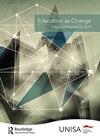梦想在我们手中:一位非洲女性主义者与前ESP学生一起构建知识制造项目
IF 1
4区 教育学
Q3 EDUCATION & EDUCATIONAL RESEARCH
引用次数: 1
摘要
本文介绍了一个研究项目,该项目与前扩展研究项目的学生合作,通过在线、多模式的合作创造知识。知识制造并非政治中立,该项目和文章在一定程度上回应了2015/2016年南非学生抗议者要求非殖民化和改变大学课程的呼吁。该项目借鉴了非洲女权主义思想,强调殖民主义、资本主义和父权制的交叉压迫,这些压迫继续影响着南非和非洲大学知识层次的理论选择。推动大学和社会成败的“种族”、阶级和性别不平等成为该项目中讨论的一些主题,前学生作为联合研究人员合作设计主题、应对措施和传播方式。Ntseane的集体世界观、精神、共同的知识取向和共同的知识创造的重叠原则是影响项目想象和运行方式的主题。作为首席研究员和联合研究员的前讲师,我的职位是利用非洲女权主义指导来确定的,这也为该项目的伦理原则提供了信息。本文章由计算机程序翻译,如有差异,请以英文原文为准。
With Dreams in Our Hands: An African Feminist Framing of a Knowledge-Making Project with Former ESP Students
This article introduces a research project that works with former Extended Studies Programme students to make knowledge that emerges through online, multimodal collaborations. Knowledge-making is not politically neutral, and the project and article are responding in part to the calls of the 2015/2016 South African student protesters to decolonise and transform university curricula. The project draws on African feminist ideas, emphasising the intersectional oppressions of colonialism, capitalism and patriarchy, which continue to influence theoretical choices in the knowledge hierarchies of South African and African universities. The “race”, class and gender inequalities that drive success or failure at university and in society become some of the topics addressed in the project, where former students as co-researchers collaborate to devise the topics, responses, and kinds of dissemination. Ntseane’s overlapping principles of a collective worldview, spirituality, a shared orientation to knowledge, and communal knowledge-making are motifs that influence how the project is imagined and run. My positionality as lead researcher and former lecturer of the co-researchers is navigated using African feminist guidance, which also informs the ethical principles of the project.
求助全文
通过发布文献求助,成功后即可免费获取论文全文。
去求助
来源期刊

Education As Change
EDUCATION & EDUCATIONAL RESEARCH-
CiteScore
1.40
自引率
0.00%
发文量
29
审稿时长
24 weeks
期刊介绍:
Education as Change is an accredited, peer reviewed scholarly online journal that publishes original articles reflecting critically on issues of equality in education and on the ways in which educational practices contribute to transformation in non-formal, formal and informal contexts. Critique, mainly understood in the tradition of critical pedagogies, is a constructive process which contributes towards a better world. Contributions from and about marginalised communities and from different knowledge traditions are encouraged. The articles could draw on any rigorous research methodology, as well as transdisciplinary approaches. Research of a very specialised or technical nature should be framed within relevant discourses. While specialised kinds of research are encouraged, authors are expected to write for a broader audience of educational researchers and practitioners without losing conceptual and theoretical depth and rigour. All sectors of education are covered in the journal. These include primary, secondary and tertiary education, adult education, worker education, educational policy and teacher education.
 求助内容:
求助内容: 应助结果提醒方式:
应助结果提醒方式:


